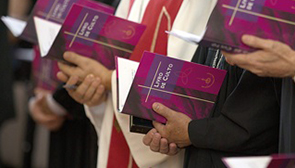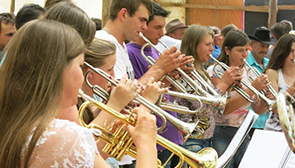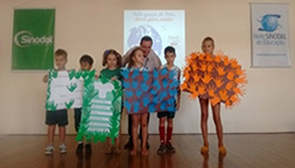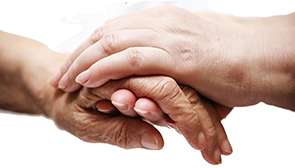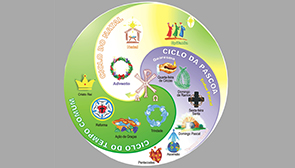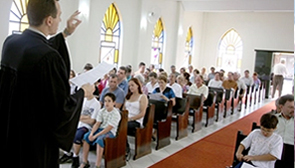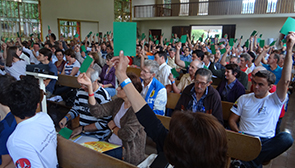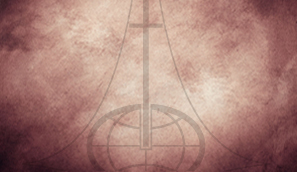Oh, Lord, how long shall I cry for help,
and you will not listen?
Or cry to you Violence!
and you will not save me?
Why do you make me witness wrong-doing
and look at trouble?
Destruction and violence are before me;
strife and contention arise.
So the law becomes slack
and justice never prevails.
The wicked surround the righteous -
therefore judgment comes forth perverted.
Habakkuk 1:2-4
Violence in our everyday life
It has been over two thousand years since the prophet uttered his complaint, but he seems to have had in mind the situation we currently experience in Brazil. The Brazilian people live increasingly frightened and terrified by the growing wave of violence which takes over the country. Kidnappings, always abominable, have already become random incidents that spare no one. Cases of robbery and murder increase, reaching even governmental authorities. Furthermore, there is the frequent unpreparedness and inability of the police in order to put an end to the violence, solve the crimes and arrest the perpetrators. Therefore, criminals can act counting on impunity or, when arrested, on the possibility of escaping or yet on a drastic reduction of the sentence. The judicial system is slow in punishing lawbreakers, and quick in granting benefits, specially to the powerful. Corruption is present at every level and in every sector. People feel unprotected, do not trust the authorities, and do not know whom to resort to. Like the prophet they cry to heaven: We can no longer stand violence! Oh, Lord, how long?
Which are the causes of that scary picture? There are certainly many.
In spite of the laudable exceptions, the evident incompetence of police and law enforcement agents to effectively stop and punish criminality is certainly one of the reasons, but on no account the only one.
A climate of general acceptance of drug use and even trade thrives in society – the former being one of the main aggravators of criminality. Poverty, unemployment, and the outrageous unfair income-distribution in our country are without a doubt evils related to economic strategies. These favour capital, profit, and, not seldom, external interests, always in detriment to the most elementary social services such as health, education, and social welfare, seriously aggravating the situation. Besides that, consumer society contributes to creating a negative and frail self-esteem, due to comparisons with other people, possibly also raising envy and greed. The logic of consumerism generates necessities which people do not have, replacing “being” by “having”, and honesty and solidarity by jewels, cars and other material goods.
Within this context the Evangelical Church of Lutheran Confession (IECLB) raises its voice in face of the growing violence against human dignity and life. We are convinced that it is urgent to restore the basic notion according to which each and every human being, created in God's image, is inviolable and has the right to live in dignity and safety.
The human being as God's image
Human life, and all related aspects, is a marvelous gift from God, originated in his unconditional love. God grants that love permanently and freely, without previously demanding any merits from us. Through Jesus, the Father accepts our image, our face, although we are unworthy and weak. In His death at the cross, the God-Son himself becoming a victim of human sin and violence, we have been accepted in a complete and definite way. The unlimited value of each person is established from that reality: For God so loved the world that he gave his only Son, so that everyone who believes in him may not perish but may have eternal life. (John 3:16) God's love in Jesus had such a magnitude that He took on Himself the whole human distress. He even assumed our destroyed and degraded human image, our pain, our suffering and radical abandonment. He even assumed our own death. He did it in order that we may have life, and have it abundantly. (John 10:10)
It is natural that people feel the need to show and to deserve a good image – but that is nothing else than a vain attempt to recover, by one’s own means, the lost image of God. However, he who accepts God's love is free from the enslavement of the merit, of the effort to recover a good image through his work, his intelligence, his wealth, his physical beauty, dressing or even through his very religiosity. That is the image of the law of the market: You must do something to be someone, You must be mighty and influent, You must have a lot of goods, You must… , human beings’ perception is totally distorted, since before God, nothing of that kind is necessary. On the contrary, God loves human beings without expecting anything in return, and that applies to every person, no one being excluded. It applies to the healthy and the sick; to the fetus and to the terminally ill. It applies to the beautiful and strong as well as to the physically or mentally handicapped. It applies to the virtuous, but it also applies to the criminals. Every person, with no exception, is God’s image. Through faith, we accept His love, the image He gives us. And that is what salvation means: meaning and hope for those who accept God.
Would human sin, injustice and violence thus be acceptable? By no means. On the contrary, God’s unconditional love is the most powerful source of strength to overcome injustice and violence. In faith, the person no longer needs to be selfish and egocentric, “self-absorbed” (that is how 16th century reformers characterized the nature of sin: firstly, not the moral flaws, but the reality of those neither oriented to God nor to their fellow human being, but rather towards themselves). Through the faith in Christ the person is reconciled with God and thus starts serving the fellow human being in his or her needs. That is, the self-absorbed needs to be cured on the reconciliation provided by God’s gracious love.
Nonetheless, what is to be done before this violent environment?
Firstly, we point out as absolutely fundamental to recover awareness of life dignity. We cannot expect to solve the problem of violence only by directly fighting crime. It is necessary to reach for its deepest causes, which reside in the social fabric itself and in understanding the human being underpinning it. Above all, it is necessary to acknowledge that violence only generates more violence, never its overcoming. Each and every human being has to be acknowledged, respected and protected in its right to life. It obviously applies to the population who feels threatened and exposed to the dangers of crime, in the streets, at work, and at home. Nevertheless, it also applies to the criminals themselves, who must be prevented in their intents and punished in their crimes, but always respecting the integrity of their lives, aiming at their social rehabilitation. In fighting crime, authorities cannot resort to the same means employed by the criminals.
Secondly, we see the construction of peace and social justice as essential, which never come up by themselves, they have rather to be built with effort and devotedness. Above all, they are never established as a result of economic growth, which must be directed towards peace and justice. That is: we need political and legal mechanisms to guarantee the population’s basic needs, i.e. education, health, food, housing, among others. We must specially encourage a permanent process towards education for peace, justice and solidarity. We should encourage all educative agents - starting with the family and followed by the school system as well as civil society institutions and church communities - to strongly place themselves into programs, initiatives and efforts to build a peace culture and mentality.
Thirdly, we point to the correct and effective fight against crime, which happens through the efficiency and agility of legal, police and judicial mechanisms by which, under the necessary respect for human dignity, population is protected and crime is fought against. It is our understanding that qualifying and better paying police forces is part of the solution, as well as a more appropriate prison system, and never the mere violent repression to crime.
We will not overcome crime by contributing to the violence spiral; that will only bring the perspective of a civil war. Without a doubt, a more expeditious judicial system is essential, one that does not discriminate against the poor. It cannot also grant privileges to the powerful. The impunity that takes over the country has to come to an end. Effective and exemplar punishment, fit to the crimes committed, is necessary. But the underlying motivation should never be retaliation and vengeance. It should be an effort for protecting society and rehabilitating criminals, always respected in their dignity. We therefore reject any idea favoring the introduction of the death penalty and denounce as outrageous, hateful and unacceptable the practice, not so uncommon, of torture and execution by members of forces in charge of fighting crime.
Conclusion
In communion with other churches in the country and the world, IECLB takes part in the Ecumenical Decade to Overcome Violence. It also claims for action through the slogan “Hands On” (“Mãos à Obra”, in Portuguese). Based on that spirit, we challenge communities as well as authorities and society’s organizations to make a determined and restless effort, above all in faith and hope, towards the construction of a culture and a society of peace, justice and solidarity, which correspond to the Brazilian people’s deepest will and to the infrangible dignity of every human being.
São Bento do Sul, State of Santa Catarina, Brazil, March 22nd, 2002.
On behalf of the Presidency and the Conference of Synodal Pastors of the Evangelical Church of Lutheran Confession in Brazil (IECLB),
Huberto Kirchheim
Pastor-President



